Please fill out the following information, and RRFC Admissions will contact you to discuss our program offerings:
Issue #213
by Liya Swift
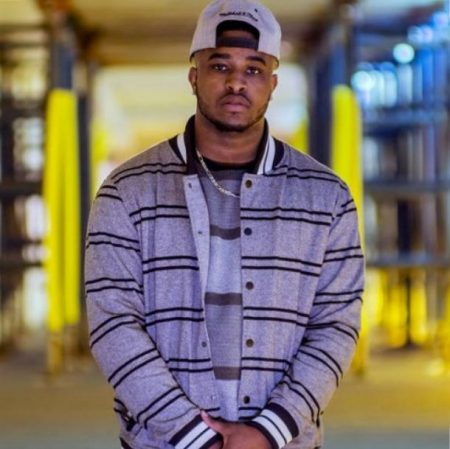
Recording Connection graduate Dre McNeil
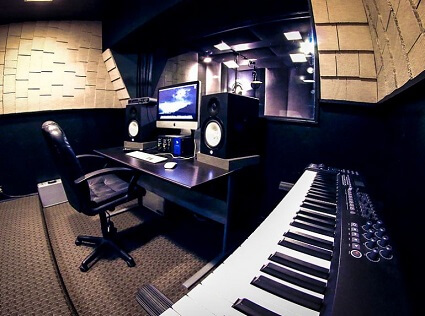
Fifty50 Studios
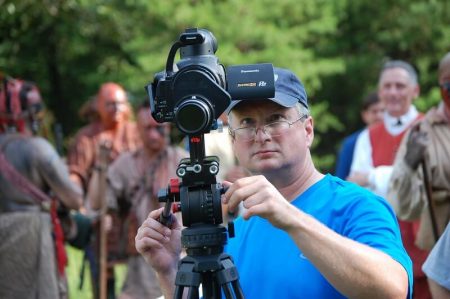 Film Connection mentor Buck Kahler has more than 30 years of filmmaking experience, starting with his career as a combat photojournalist for the U.S. Air Force, of which he is now a retired Master Sergeant, and extending onto his career as an editor, cinematographer, and independent producer, director, and writer. He has worked with A&E, The History Channel, shot video for two specials on the National Geographic Channel, and aired footage and films on PBS, including footage for the East Tennessee chapter of Ken Burns’ and Lynn Novicks’ The Vietnam War. As co-owner of Nolpix Media Buck is serious about instilling tomorrow’s film professionals with the knowledge he’s acquired through his decades-long career.
We recently spoke with Buck about documentary filmmaking, his experiences as a combat photojournalist, and garnered a number of valuable insights to share with our readership. Enjoy!
How did you get started in film in the first place?
“In 1987 I was in the Air Force…I was assigned to combat camera…So my job was as a combat photojournalist, and basically, I flew around the world to cover operations and stuff for the Joint Chiefs of Staff and the President.”
That’s hardly a normal start to a film career. Were you ever in combat war zones?
“I covered all the stuff leading up to and including the Panama invasion, everything up to and including the Gulf War, Somalia, the Bosnia situation, and then later Kosovo. Yeah, and I was assigned as an aerial photographer, which there weren’t that many of us. So I was actually an air crew member and had to go to survival school and learn all the escape routes on every Air Force aircraft ever. I even got to fly in the back of a couple fighters… I fell in love with the career and just kept doing it…
Then I got out for a couple years and got a job as an editor working on series for A&E and the History Channel. Then I went back in the Air Force to finish up my career, but I still freelanced on the side, and still edited and worked on The National Geographic Channel… Then after I retired I formed my own company and started doing stuff, mostly documentaries for PBS and that sort of thing.”
What is it about the documentary format that appeals to you?
“I feel that truth is stranger than fiction and is just as exciting as any feature fiction type thing. What’s exciting to me about documentaries is you don’t know how they’re going to end until the project is done. It’s like a surprise ending, even to me at the end. I don’t force something to end a certain way. It feels like it just organically creates itself sometimes.”
You also contributed to the massive documentary The Vietnam War by Ken Burns and Lynn Novick.
“My involvement was at the local level. Ken Burns’ folks created a fund, basically a grant for 30 PBS stations across the country. So we got a $10,000 grant from WETA, which is the Washington D.C. PBS affiliate and we created three films here. Well, I helped create three films, and then I had a friend who’s a journalism professor over at the University of Tennessee, and he had three of his grad students create films. So they created half hour films each, like three mini, 10 minute films. So we had basically two hours of local material to support Ken Burns’ and Lynn Novick’s Vietnam series.”
So The Mysterious Lost State of Franklin, a documentary you directed and produced aired on PBS. What can you tell us about that project?
“We looked into the history of East Tennessee and discovered this lost state that would have been the 14th state, you know, the original 13 colonies. This would have been the 14th state, but it lost in Congress by two votes.
So we basically had to go out and really just make friends. And that’s really the crux of making a documentary film is you have to make friends with everyone involved. So we made friends with a lot of the historic reenactor community, and they were all on board with it. They stuck with me for about three years without seeing a frame of footage…It aired locally. Then I sent it off to national PBS and didn’t expect to hear anything back. They called me back and accepted it and it became one of their most popular “interstitial films.” It was a half hour film. PBS looks for those because they fit nicely [and] help the scheduling managers.”
How long did it take to hear back from PBS?
“It really took about five months. I had pretty much forgotten that I had even sent it. I just assumed that they had rejected it because I didn’t hear a thing back, and then about five, it might have been six months later, I got a call, and they said they accepted it.”
What prompted you to start mentoring for us?
Shortly after completing the Vietnam series…a friend of mine who I work with, he’s a Grammy Award-winning sound engineer, had several externs and suggested I go ahead and give it a shot. …When I read up on the program, I realized it’s very close to how I used to train troops back in the Air Force, where I would bring people all the way up from the helper level to the journeyman level to the craftsperson level…
So they [my externs] have already got several credits under their belt, and they’re only halfway through the program. My goal for them is to make sure that each of them walks away with a short. You know, maybe a five to 10 minute short that they write, they direct, and we’re all there as support…
When it comes to building a career for oneself, are there potential opportunities students and newcomers don’t usually think about?
“What people don’t think about with films, they really think that you have to go work for a film studio or a television station or something like that but when you look at the business world, lots of midsized to large businesses have their own in-house video production, and there’s a lot of that going on. Every business out there needs a video, they need several, they need videos all the time. So I try to impress on these folks that it’s not just the film industry. There’s opportunities for professional video and film production everywhere… There is a demand for people who know what they’re doing.”
You also recently completed an archeological documentary which won an award.
“We’re looking at trying to turn that into a series…The Archaeology Channel International Film Festival in Eugene, Oregon had 800 entries, and we got Best Film, we got Best Educational Value, and several other awards for the production of the film. We were up against really stiff competition, including PBS, Nova, and there were several international folks who showed up for the festival to show their films.”
How can a Film Connection student make the most of the program while they’re in it?
“I would encourage externs to, while they’re in the program, start looking around for opportunities to be a PA, even on local indie films, no-budget films, whatever, but start building up your resume, start building up your list of credits, because the first thing that people will ask you is, ‘What have you done?’ and you can say, ‘I did all these things.’ I think that’s important to begin really working while you’re studying, get as much exposure as you can and start networking within your own community. Start getting to know people, even if you’re just a PA holding a light stand. That takes the burden off the director and it’s important to people, and people will remember that even if you’re just volunteering.”
It’s obvious that you’re really committed to mentoring our students. Why is mentorship important to you?
“I’m nearing the autumn of my career. So I’m trying to pretty much just do a big brain download into as many people as I can reach…I want to get as much information out there as possible to young people who are interested in this field, because it’s not going away. I mean, it’s changing, it’s evolving, but it’s not going away. So especially as far as cinematography tricks and techniques and just little hints that I can get across to people and have them practice, I think if they can take that with them, you know, when they’ve been working in the field for 30 years they can do something and say, ‘Oh yeah, I remember when Buck taught me that 30 years ago.’
One of my mentors was World War II combat photographer Doug Morrell (immortalized in Steven Spielberg’s documentary, Shooting War) and he taught me a lot of techniques that I use to this day. So I feel like his legacy works through me, and I’m passing all that he taught me onto them as well.”
Film Connection mentor Buck Kahler has more than 30 years of filmmaking experience, starting with his career as a combat photojournalist for the U.S. Air Force, of which he is now a retired Master Sergeant, and extending onto his career as an editor, cinematographer, and independent producer, director, and writer. He has worked with A&E, The History Channel, shot video for two specials on the National Geographic Channel, and aired footage and films on PBS, including footage for the East Tennessee chapter of Ken Burns’ and Lynn Novicks’ The Vietnam War. As co-owner of Nolpix Media Buck is serious about instilling tomorrow’s film professionals with the knowledge he’s acquired through his decades-long career.
We recently spoke with Buck about documentary filmmaking, his experiences as a combat photojournalist, and garnered a number of valuable insights to share with our readership. Enjoy!
How did you get started in film in the first place?
“In 1987 I was in the Air Force…I was assigned to combat camera…So my job was as a combat photojournalist, and basically, I flew around the world to cover operations and stuff for the Joint Chiefs of Staff and the President.”
That’s hardly a normal start to a film career. Were you ever in combat war zones?
“I covered all the stuff leading up to and including the Panama invasion, everything up to and including the Gulf War, Somalia, the Bosnia situation, and then later Kosovo. Yeah, and I was assigned as an aerial photographer, which there weren’t that many of us. So I was actually an air crew member and had to go to survival school and learn all the escape routes on every Air Force aircraft ever. I even got to fly in the back of a couple fighters… I fell in love with the career and just kept doing it…
Then I got out for a couple years and got a job as an editor working on series for A&E and the History Channel. Then I went back in the Air Force to finish up my career, but I still freelanced on the side, and still edited and worked on The National Geographic Channel… Then after I retired I formed my own company and started doing stuff, mostly documentaries for PBS and that sort of thing.”
What is it about the documentary format that appeals to you?
“I feel that truth is stranger than fiction and is just as exciting as any feature fiction type thing. What’s exciting to me about documentaries is you don’t know how they’re going to end until the project is done. It’s like a surprise ending, even to me at the end. I don’t force something to end a certain way. It feels like it just organically creates itself sometimes.”
You also contributed to the massive documentary The Vietnam War by Ken Burns and Lynn Novick.
“My involvement was at the local level. Ken Burns’ folks created a fund, basically a grant for 30 PBS stations across the country. So we got a $10,000 grant from WETA, which is the Washington D.C. PBS affiliate and we created three films here. Well, I helped create three films, and then I had a friend who’s a journalism professor over at the University of Tennessee, and he had three of his grad students create films. So they created half hour films each, like three mini, 10 minute films. So we had basically two hours of local material to support Ken Burns’ and Lynn Novick’s Vietnam series.”
So The Mysterious Lost State of Franklin, a documentary you directed and produced aired on PBS. What can you tell us about that project?
“We looked into the history of East Tennessee and discovered this lost state that would have been the 14th state, you know, the original 13 colonies. This would have been the 14th state, but it lost in Congress by two votes.
So we basically had to go out and really just make friends. And that’s really the crux of making a documentary film is you have to make friends with everyone involved. So we made friends with a lot of the historic reenactor community, and they were all on board with it. They stuck with me for about three years without seeing a frame of footage…It aired locally. Then I sent it off to national PBS and didn’t expect to hear anything back. They called me back and accepted it and it became one of their most popular “interstitial films.” It was a half hour film. PBS looks for those because they fit nicely [and] help the scheduling managers.”
How long did it take to hear back from PBS?
“It really took about five months. I had pretty much forgotten that I had even sent it. I just assumed that they had rejected it because I didn’t hear a thing back, and then about five, it might have been six months later, I got a call, and they said they accepted it.”
What prompted you to start mentoring for us?
Shortly after completing the Vietnam series…a friend of mine who I work with, he’s a Grammy Award-winning sound engineer, had several externs and suggested I go ahead and give it a shot. …When I read up on the program, I realized it’s very close to how I used to train troops back in the Air Force, where I would bring people all the way up from the helper level to the journeyman level to the craftsperson level…
So they [my externs] have already got several credits under their belt, and they’re only halfway through the program. My goal for them is to make sure that each of them walks away with a short. You know, maybe a five to 10 minute short that they write, they direct, and we’re all there as support…
When it comes to building a career for oneself, are there potential opportunities students and newcomers don’t usually think about?
“What people don’t think about with films, they really think that you have to go work for a film studio or a television station or something like that but when you look at the business world, lots of midsized to large businesses have their own in-house video production, and there’s a lot of that going on. Every business out there needs a video, they need several, they need videos all the time. So I try to impress on these folks that it’s not just the film industry. There’s opportunities for professional video and film production everywhere… There is a demand for people who know what they’re doing.”
You also recently completed an archeological documentary which won an award.
“We’re looking at trying to turn that into a series…The Archaeology Channel International Film Festival in Eugene, Oregon had 800 entries, and we got Best Film, we got Best Educational Value, and several other awards for the production of the film. We were up against really stiff competition, including PBS, Nova, and there were several international folks who showed up for the festival to show their films.”
How can a Film Connection student make the most of the program while they’re in it?
“I would encourage externs to, while they’re in the program, start looking around for opportunities to be a PA, even on local indie films, no-budget films, whatever, but start building up your resume, start building up your list of credits, because the first thing that people will ask you is, ‘What have you done?’ and you can say, ‘I did all these things.’ I think that’s important to begin really working while you’re studying, get as much exposure as you can and start networking within your own community. Start getting to know people, even if you’re just a PA holding a light stand. That takes the burden off the director and it’s important to people, and people will remember that even if you’re just volunteering.”
It’s obvious that you’re really committed to mentoring our students. Why is mentorship important to you?
“I’m nearing the autumn of my career. So I’m trying to pretty much just do a big brain download into as many people as I can reach…I want to get as much information out there as possible to young people who are interested in this field, because it’s not going away. I mean, it’s changing, it’s evolving, but it’s not going away. So especially as far as cinematography tricks and techniques and just little hints that I can get across to people and have them practice, I think if they can take that with them, you know, when they’ve been working in the field for 30 years they can do something and say, ‘Oh yeah, I remember when Buck taught me that 30 years ago.’
One of my mentors was World War II combat photographer Doug Morrell (immortalized in Steven Spielberg’s documentary, Shooting War) and he taught me a lot of techniques that I use to this day. So I feel like his legacy works through me, and I’m passing all that he taught me onto them as well.”
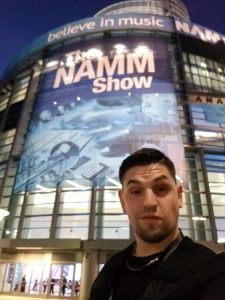 Recording Connection graduate Efrain Matias got hired at the San Diego studio where he trained with mentor and studio owner Bernard “IQue” Johnson, who also recently invited him to NAMM in Tennessee! “I Landed a Job!…Since I’ve been getting a lot of tangible work under my belt and really applying the concepts and techniques Bernard has shared with me, I seem to have landed me a lead engineering position here at Noize Factory Studios.” More on this in an upcoming newsletter!
More on this in an upcoming newsletter!
Recording Connection graduate Efrain Matias got hired at the San Diego studio where he trained with mentor and studio owner Bernard “IQue” Johnson, who also recently invited him to NAMM in Tennessee! “I Landed a Job!…Since I’ve been getting a lot of tangible work under my belt and really applying the concepts and techniques Bernard has shared with me, I seem to have landed me a lead engineering position here at Noize Factory Studios.” More on this in an upcoming newsletter!
More on this in an upcoming newsletter!
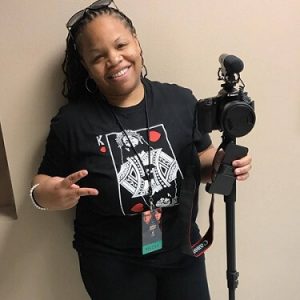 Film Connection student Alisha Simmons is happy to hit the ground running right from Day One of her externship at Rocco Films: “During my initial meeting with my mentor, I had the pleasure of sitting in on a production meeting, as the crew is planning to shoot a film next week. My mentor, Rocco [Michaluk], has placed me on the team and I will be serving as a Production Assistant. The film will be shooting for 5 days and I will be able to participate at least 4 out of the 5 days…I am really excited to work with the team next week and to continue to learn and absorb as much as I can.”
Film Connection student Alisha Simmons is happy to hit the ground running right from Day One of her externship at Rocco Films: “During my initial meeting with my mentor, I had the pleasure of sitting in on a production meeting, as the crew is planning to shoot a film next week. My mentor, Rocco [Michaluk], has placed me on the team and I will be serving as a Production Assistant. The film will be shooting for 5 days and I will be able to participate at least 4 out of the 5 days…I am really excited to work with the team next week and to continue to learn and absorb as much as I can.”
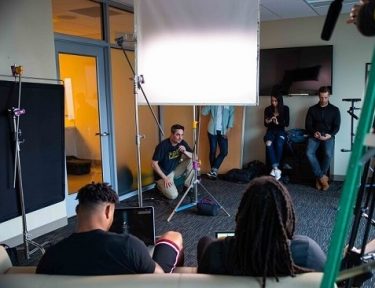 Film Connection mentor Sean McCarthy of Guerilla Wanderers Films sent word that their newest extern Gabe Gottstein had the opportunity of working on-set at Levi’s Stadium with, not one but 2 professional NFL players from the 49ers and the Seahawks.
That’s Gabe down on one knee, quietly observing and on standby.
Film Connection mentor Sean McCarthy of Guerilla Wanderers Films sent word that their newest extern Gabe Gottstein had the opportunity of working on-set at Levi’s Stadium with, not one but 2 professional NFL players from the 49ers and the Seahawks.
That’s Gabe down on one knee, quietly observing and on standby.
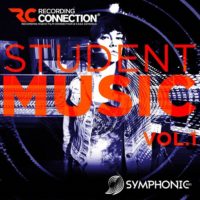 Heard our Student Music Mixtape yet? In partnership with Symphonic Distribution, we’re excited to help our students get their music out to the world!
The Recording Connection is now offering this great opportunity for our students to broaden their understanding of the new role digital distribution companies like Symphonic Distribution can play in helping release their tracks and propel their careers forward!
Heard our Student Music Mixtape yet? In partnership with Symphonic Distribution, we’re excited to help our students get their music out to the world!
The Recording Connection is now offering this great opportunity for our students to broaden their understanding of the new role digital distribution companies like Symphonic Distribution can play in helping release their tracks and propel their careers forward!

RRFC is education upgraded for the 21st century.
Get the latest career advice, insider production tips, and more!
Please fill out the following information, and RRFC Admissions will contact you to discuss our program offerings:
Stay in the Loop: Subscribe for RRFC news & updates!
© 2025 Recording Radio Film Connection & CASA Schools. All Rights Reserved.


